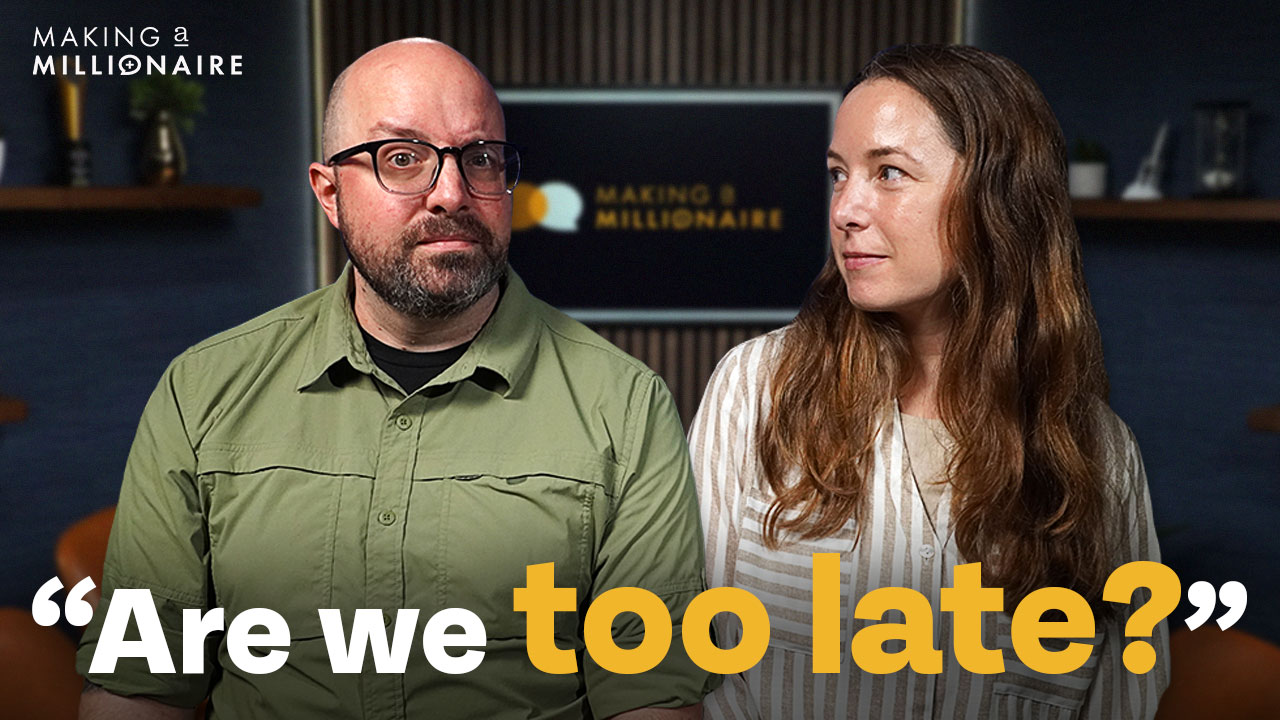Next up, we've got a question from Rebecca. She says, "My husband and I are in our 40s and just started retirement savings. We feel so behind. What's the best way to catch up?"
Okay, so the best way to catch up, in my opinion, is to figure out how far behind you really are. To do this, you need to define what you want your future to look like. What are you saving for? Retirement at age 65? Well, if you're in your 40s or around 40, and your retirement is at 65, that still gives you 25 years to do some meaningful heavy lifting towards wealth building. So while you may feel behind, and while you may even be behind, don't get discouraged, because being in your 40s is still, earmuffs, young. You still have a lot of time to continue building wealth if you continue making really sound decisions.
So, one of the things you need to do is define what your number is. What is the goal that you're working towards? What's the thing that you're trying to accomplish? Once you know that answer, you can begin backing into the steps necessary to get you there. We talk about for young folks in their 20s, 25, 30-year-olds, "Hey, we really want you saving 25%." Well, if you're in your mid-40s and you want to retire at 60, I'm making up a number here, saving 25% might not get you there. You might have to figure out, "Okay, how do I get my savings to 30% or 35%? How do I cut down my living expenses?"
It's going to be impossible to determine if you are behind unless you know what the finish line looks like, what the destination looks like, what the goal line looks like. So then, you can back into where you should be on your journey. You would say, "Begin with the end in mind," stealing the 7 Habits of Highly Effective People. I think that's important. And then I think if you do know the number, you can then hone in on, "Okay, do I need to be saving 30%, 35%, 40%?" And then if you look at your life and go, "Man, there's no way under my current situation that I can save and invest 40% towards the future," then you can reevaluate where you are with your life.
Realize that the messy middle is typically in your 30s. A lot of people in their late 30s to early 40s start getting into massive wealth building because their obligations with the kids are starting to wane a little bit. You have more time. That's where you have a lot of opportunities. You can think big picture. Do you downsize because now that the kids, you know, you don't need to have a place far enough away so you can watch TV at night and not wake the baby up because your kids are now 12 years old? You're not worried about that stuff anymore. They're keeping you up. If anything, maybe you can go into a smaller house or maybe, you know, it's one of those things where the kids' obligations aren't as much because they're out driving. Once they're 16, they're they kind of left that position where you are now the influencer. Now their friends and their peer group are influencing them. When they're out there and they're disappearing in their car, maybe you take on another job or something.
We have picked up quite a few employees who raise kids for a decade or so, and then once the kids become more self-sustaining and independent, they start working. This would turbocharge their wealth building journey if they had another income source or income stream. Rebecca, you need to have this mindset and do the homework first. Feeling sorry and wishing you had done more when you were younger adds zero value to the future. What adds value is knowing the number, as Bo shared, and then getting busy making it happen. You can do it. I got so excited because we just did a Time episode where we showed that even under normal circumstances, it takes a typical millionaire a 27-year journey. If you're hyper saving, you can speed up the process, but even a 40-year-old could easily become a millionaire by the typical retirement age of 60. You are in control of where you are in this journey, so make sure your life reflects where you want to be. Here are two pieces of homework for Rebecca or whoever relates: first, keep an eye out for the most valuable asset in building wealth, as the time episode shows. Second, if you need to figure out your number and calculate it, we have a whole course and tool called
'Know Your Number' that does exactly that. It will speak to the more analytical side of showing you how to calculate it, and it has a tool that will help you do it more automatically. Go check it out, it might be exactly what you need. Lastly, it could also save a marriage or relationship because when one person realizes the importance of this and the other doesn't, it can create a divide.
'Know Your Number' could be the arbitrator to calm the person down who wants to sell everything to fix it and the person who should take it more seriously. It could be the conversation starter that helps you meet in the middle.
If you want to know how powerful your dollar bills are, check out our
Wealth Multiplier deliverable here.














